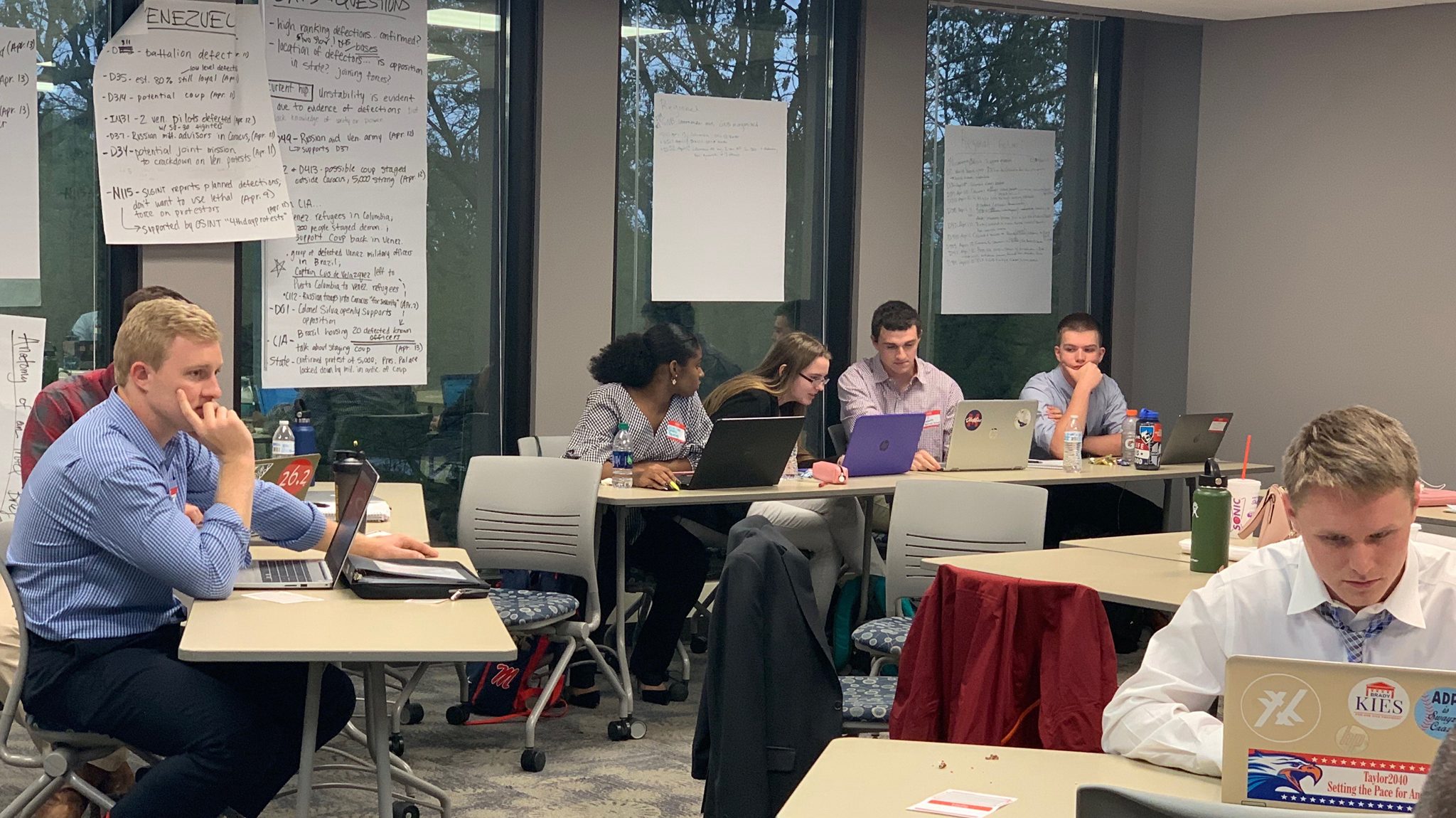
UM students work to analyze reports coming in during the Days of Intrigue intelligence simulation, hosted by the university’s Center for Intelligence and Security Studies. Photo courtesy Victoria Gallegos
OXFORD, Miss. – Earlier this month, while most University of Mississippi students spent the beginning of their weekend going about their lives, 96 of their peers were huddled in Lamar Hall, focused on the ongoing crisis in Venezuela.
Reports of unrest were cascading in following the failure of a hydroelectric power plant in the South American country and a resulting nationwide blackout. News of drinking water shortages and mass protests in the streets, as well as stories of foreign intervention and assassinations, poured in as rumors swirled and various types of security threats – economic, political, military and humanitarian – emerged.
Through Friday evening and into Saturday, the Ole Miss students analyzed stacks of intelligence reports on the unfolding crisis. They were busy using critical thinking, writing and briefing skills and attempting to better understand the complex event with multiple storylines. Officials in Washington, D.C., were expecting from the students timely and precise assessments of how the turmoil was affecting U.S. interests.
By Saturday evening, the situation was over. The students returned to their normal lives. The exercise had been just that: the annual Days of Intrigue intelligence simulation, hosted by the university’s Center for Intelligence and Security Studies, or CISS, which is part of the Intelligence Community Centers of Academic Excellence program.
“Days of Intrigue is an intelligence simulation that the Center for Intelligence and Security Studies hosts each spring for all students in the CISS program,” said Timothy Russell, director of the center, which was founded in 2008. “The objectives of the exercise are to give students an opportunity to experience what life is like as an analyst working a crisis account in the U.S. intelligence community and to give them an opportunity to apply the analytic tradecraft that we teach in the intelligence and security studies curriculum.
“There also is a recruiting and professional networking component to the simulation as the students are assigned to teams corresponding to intelligence community agencies, and the teams are led by actual representatives from those agencies.”
The three-day event began Thursday (April 11) with a visit to campus and keynote address from Harry Coker Jr., executive director of the National Security Agency, an intelligence agency within the U.S. Department of Defense that focuses on collecting and processing foreign intelligence and cybersecurity.
Coker’s discussion in Bondurant Hall focused on threats to American interests and specifically addressed the need for all 17 U.S. intelligence community agencies to collaborate and to hire and train people with a diverse set of skills.

Harry Coker Jr., executive director of the National Security Agency, kicks off the Center for Intelligence and Security Studies’ 2019 Days of Intrigue exercise at the University of Mississippi with a keynote address. Photo by Thomas Graning/Ole Miss Digital Imaging Services
“Serving our nation – our great nation – is a high, high honor,” he said. “We do know that diversity of thought and experiences truly solve the nation’s hardest problems. And your program does reinforce that aspect.
“The intelligence community needs people with a variety of skills.”
Twenty officers from nine other intelligence agencies also were in attendance for Coker’s speech. They, too, offered advice to students – “master your tradecraft,” “be outgoing” – when Coker turned over the floor so students could ask questions.
More career advice came Friday morning (April 12) with the panel “Careers in National Intelligence,” which included a panel discussion among officials from different U.S. intelligence agencies, including the CIA, FBI, National Security Agency and U.S. Department of Homeland Security. Students were encouraged to bring their resumes to the event.
“Visits from intelligence community agency recruiters help our students better understand the agencies’ missions and what the agencies are looking for in applicants,” Russell said. “The recruiters also are able to share stories about what life is like working in the intelligence community, which our students find valuable.”
Russell, who holds a doctorate in political science from UM, joined the CISS in August 2017 as an instructor following a more-than-10-year career in the CIA. He was named director in April 2018.
The weekend – and specifically, the simulation – is a unique and fun complement to the six courses of the intelligence and security studies program minor, Russell said. CISS faculty began working with Venezuela experts in the intelligence community in December to develop the plot, and five intelligence and security studies students worked with CISS faculty to produce approximately 475 pieces of intelligence reporting for the simulation.
“It definitely requires you to flex a different mental muscle,” Russell said, reflecting on the process of creating the simulation’s plot. “It’s a bit like fiction writing, but it’s not just an exercise in creativity for creativity’s sake. You have to make it realistic in order for the students to derive maximum value.
“The CISS strives to make its curriculum as applied as it possibly can be. In other words, everything we’re teaching our students in classes and through the extracurricular activities tracks very closely to what an intelligence analyst actually does. You could go through the Days of Intrigue simulation five times in a row on different teams, and you’re going to have a different experience every time.”
The exercise has become more challenging and realistic each year, said Caitlyn Boitnott, a political science major from Fredericksburg, Virginia, and a three-year veteran of Days of Intrigue.
“The simulation just helps provide insight to us about the intelligence community and what our life could look like in that environment,” Boitnott said. “It definitely portrays a time-sensitive task and keeps you on your toes, and I would say that is my favorite part because it is so realistic.”
Following graduation, Boitnott, who is a junior, hopes to pursue a career in the intelligence community doing counterterrorism or counterintelligence work. The simulation helps her prepare for that career by providing valuable contacts with intelligence agency members.
“You won’t find that anywhere else,” she said. “It also helps us because we are able to figure out exactly what each agency does in a crisis, and we can figure out what we enjoy doing and what we don’t.”

Timothy Russell, director of the UM Center for Intelligence and Security Studies, addresses participants at the Days of Intrigue event. Photo by Thomas Graning/Ole Miss Digital Imaging Services
The simulation is similar to solving a puzzle, Russell said. But students don’t need to understand every single thing that is happening in the plot. Instead, they are asked to identify the broad trends: Which way are things moving? Who are the main actors that are involved? What are their motivations? What are the next steps? Students also must identify threats and opportunities for U.S. interests.
“These are the things that policymakers need to know in order to craft a policy that can minimize potential threats and advance U.S. interests,” Russell said. “It’s not just about stopping something from exploding, for example. It’s also about helping policymakers understand how the landscape is evolving and identifying what is just beyond the horizon.”
For Kyle McDougall, a junior political science major from Milton, Georgia, Days of Intrigue, with its real-world situations, laid important groundwork for his future career path through its combination of teaching better teamwork skills and building efficient communication expertise, he said.
“Days of Intrigue teaches people how to work under pressure when a situation is time-sensitive,” said McDougall, who plans to pursue a career in intelligence, specifically military intelligence and then later within the U.S. intelligence community. “It prepares one to use critical thinking under pressure when so much is on the line. Days of Intrigue prepares students by teaching them how to write timely, precise and objective analytical pieces on a situation that can be so fluid.
“These characteristics of being able to work under pressure and communicate within a group not only prepares one for a career in the intelligence community but also a career in any field. Any and all students can benefit from the experience.”